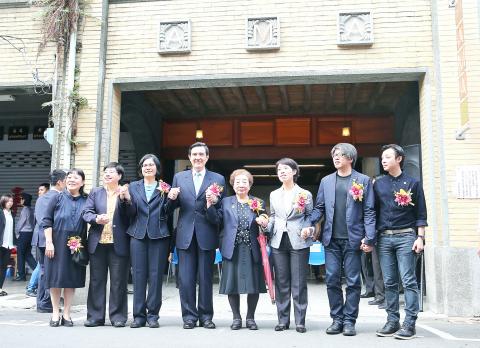The plaque on a museum dedicated to Taiwanese “comfort women,” who were forced into sexual slavery by the Japanese Imperial Army during World War II, was unveiled on Tuesday, International Women’s Day.
It was a momentous day in the history of the women’s rights movement in Taiwan, Taipei Women’s Rescue Foundation chairwoman Huang Shu-ling (黃淑玲) said.
After more than a decade, the foundation has realized its dream of establishing a museum in memory of Taiwanese comfort women, Huang said at a ceremony in Taipei, which was attended by President Ma Ying-jeou (馬英九) and Chen Lien-hua (陳蓮花), a former comfort woman.

Photo: CNA
The Ama Museum promotes peace and human rights, Ma said, adding that it opens a new chapter in the history of Taiwanese comfort women.
That part of history must be preserved not for revenge, but to reveal the truth and remember the lessons of the war, Ma said, urging Japan to do more in dealing with the issue of comfort women.
Chen, 92, said she was grateful to see the establishment of the museum.
She is one of three surviving Taiwanese comfort women who have spoken openly about their suffering during the war.
In response to questions about Japan’s handling of the issue, she said that the Japanese government has not responded to their demands, adding that she feared that she might not live long enough to see the day when Japan issues a formal apology and offers compensation.
“Ama” means “grandmother” in Hoklo (commonly known as Taiwanese). The foundation calls former comfort women “ama,” as most of them are in their late 80s or early 90s.
The foundation said it hopes that the museum would become a home for comfort women and a place where they would always be remembered. One of the goals of the foundation is to inform future generations about the history of comfort women and women’s rights, it added.
Housed in a two-story building and covering 150 ping (496m2), the museum is to feature a permanent exhibition on Taiwanese comfort women, displaying photographs, documents and videos related to them, as well as the exchanges over the past two decades between foundation members and Taiwanese comfort women, the foundation said.
In addition to the exhibition, the foundation is to organize workshops and seminars at the museum on topics such as human rights and sexual abuse, it added.
The museum is located in a renovated building in Taipei’s historic Dadaocheng (大稻埕) area and its formal opening is scheduled to take place in September, the foundation said.
The opening is to mark the foundation’s 25 years of efforts in helping comfort women cope with their mental anguish and seek justice and compensation from Japan. Over the past two decades, it has collected many first-hand accounts since it began interviewing the women, the foundation said.
More than 2,000 Taiwanese women were forced into sexual slavery by the Japanese military during the war, according to the foundation.

ANOTHER EMERGES: The CWA yesterday said this year’s fourth storm of the typhoon season had formed in the South China Sea, but was not expected to affect Taiwan Tropical Storm Gaemi has intensified slightly as it heads toward Taiwan, where it is expected to affect the country in the coming days, the Central Weather Administration (CWA) said yesterday. As of 8am yesterday, the 120km-radius storm was 800km southeast of Oluanpi (鵝鑾鼻), Taiwan’s southernmost tip, moving at 9kph northwest, the agency said. A sea warning for Gaemi could be issued tonight at the earliest, it said, adding that the storm is projected to be closest to Taiwan on Wednesday or Thursday. Gaemi’s potential effect on Taiwan remains unclear, as that would depend on its direction, radius and intensity, forecasters said. Former Weather Forecast

As COVID-19 cases in Japan have been increasing for 10 consecutive weeks, people should get vaccinated before visiting the nation, the Centers for Disease Control (CDC) said. The centers reported 773 hospitalizations and 124 deaths related to COVID-19 in Taiwan last week. CDC Epidemic Intelligence Center Director Guo Hung-wei (郭宏偉) on Tuesday said the number of weekly COVID-19 cases reported in Japan has been increasing since mid-May and surpassed 55,000 cases from July 8 to July 14. The average number of COVID-19 patients at Japan’s healthcare facilities that week was also 1.39 times that of the week before and KP.3 is the dominant

The Chinese Communist Party’s (CCP) working group for Taiwan-related policies is likely to be upgraded to a committee-level body, a report commissioned by the Mainland Affairs Council (MAC) said. As Chinese President Xi Jinping (習近平) is increasingly likely to upgrade the CCP’s Central Leading Group for Taiwan Affairs, Taiwanese authorities should prepare by researching Xi and the CCP, the report said. At the third plenary session of the 20th Central Committee of the CCP, which ended on Thursday last week, the party set a target of 2029 for the completion of some tasks, meaning that Xi is likely preparing to

US-CHINA TRADE DISPUTE: Despite Beijing’s offer of preferential treatment, the lure of China has dimmed as Taiwanese and international investors move out Japan and the US have become the favored destinations for Taiwanese graduates as China’s attraction has waned over the years, the Ministry of Labor said. According to the ministry’s latest income and employment advisory published this month, 3,215 Taiwanese university graduates from the class of 2020 went to Japan, surpassing for the first time the 2,881 graduates who went to China. A total of 2,300 graduates from the class of 2021 went to the US, compared with the 2,262 who went to China, the document showed. The trend continued for the class of 2023, of whom 1,460 went to Japan, 1,334 went to